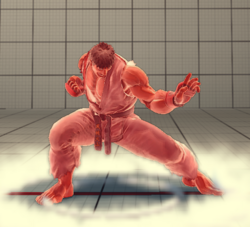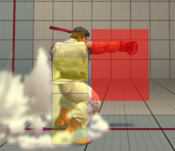System
Remix has a variety of system mechanics, though since the game has such a huge amount of unique tools per character, your interaction with these mechanics will often be defined by who you play.
Movement
Movement
Movement speed in Remix has been largely turned up from Ultra, with each character having a much faster walkspeed. Dashes are extremely freeform, as almost every character can cancel their dash into normals or other movement options. Backdashes are similar, but tend to have short periods of invincibility on startup.
Walkspeeds, dashes and various dash styles, and air movement is extremely unique to each character. A table listing the frame data of each movement option is listed below, to allow for more direct comparisons.
| Walkspeed | |||||
|---|---|---|---|---|---|
| Character | Speed | ||||
| Dash Duration | |||||
|---|---|---|---|---|---|
| Character | Speed | Duration | Cancels | ||
| Walkspeed | |||||
|---|---|---|---|---|---|
| Character | Speed | Duration | Invuln Frames | ||
Meter
Meter
Meter refers to the EX meter at the bottom of the screen. This is separated into 4 sections, each of which is referred to as a bar. Meter can be built in a variety of ways. Landing attacks builds more than anything else, and short combos can build almost a full bar. You built a small amount when the opponent blocks your attack, and a similarly small amount when you block or get hit. Whiffing normals also slowly builds meter, with specials building the most on whiff.
EX Moves
EX moves are the cheapest metered option you have. Doing any special while pressing 2 buttons will power up the special at the cost of a bar of meter. EX moves often come with extra effects, such as being plus, being invincible, giving hard knockdowns, or more. EX moves follow the same cancelling rules as specials, so anything that can cancel to meterless specials can cancel to EX specials.
Supers
Supers have been changed largely from Ultra, now only costing two bars of meter. Certain supers can cost four bars, though these are rare and tend to be heavily rewarding. Supers follow unique cancelling rules, as a majority of specials can cancel into supers, allowing them much more utility in combos. They also often possess other strong utilities, such as invincibility, punishing fireballs, speed, anti-airing, and more.
When selecting your character, a prompt to choose between Supers will pop up. Selecting the Remix option allows you to use all of your supers with no downside, so it should be selected at all times.
Charge
Charge
Charge is the new system mechanic of Remix, replacing the Revenge Gauge of Street Fighter IV. Charge is built in three ways:
Holding MP+MK to charge will quickly build your Charge meter. Charge is built quickly this way, and it is also the only way to manually get charge, making it very rewarding to do in neutral or after a knockdown.
Getting hit will also build charge, and after a long combo you will generally have enough charge meter to Charge Cancel or Alpha Counter afterwards.
Spending your EX meter will also reward you with a bit of charge. Spending an EX move will build 1/4th of a bar, while a super will build 1/2.
Charge can be spent on two options, Charge Cancel and Alpha Counter. Both options cost a single bar each, and you can have up to two bars of Charge available.
Charge will not carry over between rounds, so spending it more freely is encouraged rather than saving it.
Charge Cancel
Charge Cancel
Charge Cancels (sometimes called Roman Cancels or EX Cancels, abbreviated as CC) are one of the two ways you can spend your Charge meter. Done by pressing MP+MK during most attacks, they will spend a bar to immediately cancel whatever you were doing and return you to neutral. These have a variety of freeform uses: making reversals safe, creating new pressure opportunities, and cancelling the endlag of whiffed normals or projectiles to be safe.
A charge cancel used during a juggle will also reset the juggle value entirely, allowing you to extend a combo much further when normally you wouldn't have an extension at all. This can be great for meterbuild, high damage loops, or ensuring a kill without spending meter.
Esoteric Note: if a move is set unable to be charge canceled at some point, inputting the charge cancel during that time will cause it be buffered to happen instantly the first frame it can. If the move is impossible to CC, you will instead start charging the first frame you become actionable (though it will only last for one frame unless you hold the button.) Some characters can abuse this to get charge at the end of combos without risking an accidental CC.
Alpha Counter
Alpha Counter
| Damage | Guard | Cancel | Startup | Active | Recovery | On Hit | On Block |
|---|---|---|---|---|---|---|---|
| 10, 100 | Mid | N/A | 10 | 2 | 31 | KD | -17 |
| |||||||
Alpha Counter is a risky but strong universal guard cancel and reversal. On hit, it grants you a soft knockdown, allowing you to get some offense going from what may have been a losing scenario. Being able to use it as a guard cancel makes it great for punishing things that are normally safe, such as plus on block specials or pokes. As a reversal, it will go through any strike or projectile based attack, but it can be thrown on startup, making it risky to use against tick throws. Cancelling into it is more useful for baiting an opponents AC, though you may find simply Charge Cancelling is more efficient.
Note: Ibuki has a unique Alpha Counter where she performs a strike invulnerable version of her 236K command dash, This special AC has no hitbox, but recovers much quicker then other ACs to compensate.
Combos
Combos
The combo system of Remix is largely based on cancels that lead into juggles, with long and damaging juggle-based combo structure. Certain characters retain links, particularly those with no chain options, though they are much easier in Remix thanks to the buffer added on normals. Characters who have chains will rely on them heavily in combos, and generally speaking, having chains is better than not having them.
Juggle combos still work with the Juggle Point system from Ultra, though the values are now much more forgiving. Normals can be used in juggles as well, with lights causing an air reset and mediums/heavies preserving the juggle state for followups. Unlike most specials, normals have infinite juggle potential (a trait often referred to as "anywhere juggle" after the kof terminology for the same thing). Optimized combos in Remix will often involve juggles with normals because of this. Lights are commonly used to set up reset scenarios for better mixup potential, as the knockdown system is much more fluid in Remix.
Chains
Chains
Many characters have unique chain systems, which allow them to cancel normals into other normals. Chains vary heavily from character to character, and are a defining factor of how they play. Some characters can chain from lights to mediums to heavies, usually called a Magic Series as a reference to the Marvel vs Capcom chain system. Other characters can chain from lights to mediums or heavies, only chain mediums into heavies, have unique chains with various different normals, or have no chains at all. A majority of characters can chain into command normals, though this too isn't entirely universal.
Chains will be listed in a character's data section at the top of their overview pages. There is also a table below that goes through the roster and shows their chains.
Legend:
L = Any Light Attack
M = Any Medium Attack
H = Any Heavy Attack
LP/MP/HP = Individual Punches
LK/MK/HK = Individual Kicks
CMD = Command Normals
| Chains | |||||
|---|---|---|---|---|---|
| Character | Chains | ||||
| Ryu | L > M > H > CMD | ||||
Knockdowns
Knockdowns
Remix has two kinds of knockdowns: Soft Knockdowns and Hard Knockdowns. The defining difference between them is the ability to Tech, also called Quickrise.
Soft Knockdowns (SKD) are the most common form of knockdown, and can be teched. Teching is done by pressing any button or direction as you land. A successful tech will cause you to quickly stand up, and the game will reward you with a "Technical" pop up if done properly. Teching is important, as the slower knockdown allows the opponent to set up more powerful offense.
Hard Knockdowns (HKD) are more rare, but don't allow the opponent to tech. This allows you to set up much more powerful offense, such as a meaty projectile or a safejump. Most EX moves and a majority of supers cause hard knockdown, allowing you to spend meter for better okizeme.
Rolls
Rolls
Rolls are a universal mechanic done on your wakeup after a knockdown. By holding left or right plus any two buttons, you can roll in a chosen direction. Rolls are invincible to strikes, allowing you to dodge out of the way of meaty attacks and potentially punish. They can be thrown at any point, and have endlag that can be hit, making them punishable if predicted. You can roll regardless of knockdown, and you can either tech and roll or not tech and roll on soft knockdowns.
Street Fighter IV Remix is a mod of Street Fighter IV developed by MiriamBurgers and Anotak.















































